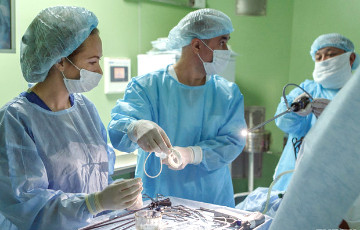Belarusian Medical Professional: Our Situation Is Unique
7- 30.07.2021, 8:05
- 21,124

If the power changes, Belarusian medicine has brilliant prospects.
Over the last year, dozens of medical workers were fired for political reasons because of participation in protests or "criticism of the authorities", despite the acute shortage of personnel (according to the nationwide bank of vacancies as of July 29, Belarus needs more than 4500 doctors, 2988 nurses, over 3000 paramedics and nurses).
Andrei Vitushko, a pediatric resuscitator and neonatologist, is among the Belarusian doctors who have been dismissed for his civic position. Late last year, he had to leave the Mother and Child center, where he used to work for over 20 years, reports Salidarnasts.
Within the framework of the analytical project The Fourth Republic, the doctor told how the problems in Belarusian medicine had accumulated, whether the health care system had passed the test of the coronavirus and what changes were necessary for doctors and patients not to go abroad. We have chosen the key issues.
- Belarus has a unique situation: we have actually preserved the Soviet health care model, the "Semashko model". There is a big imbalance in the hospital sector: Belarus is among the top ten countries in the world in the number of hospital beds per capita. This is a legacy we inherited from the Soviet Union.
"Semashko's model" was formed from the 20-30's until the beginning of World War II, the main public health problem was infectious diseases, and to cope with them, universal vaccination and a large number of hospitals were needed, so that it was possible to isolate and cure many people at once. So it was quite effective for its time.
But now the public disease system has changed. I mentioned it even before the coronavirus. Chronic diseases have become the dominant cause of death. About 80% of Belarusians die from heart diseases, lung diseases, vascular diseases, oncology and diabetes. It is impossible to cure them completely by simply putting a person in a hospital; thus, the number of hospitals all over the world has begun to shrink.
Belarus, says Dr. Vitushko, has also followed the path of reducing hospitals, but very slowly. After the outbreak of coronavirus, it was a plus. One could easily convert 30-40% of medical institutions in a large city to receive covid patients, and the health care system would not "lie down". On the other hand, precisely during this period, Belarusians stopped believing the optimistic reports of the Ministry of Health about the low level of disease incidence - the personal experience of friends and relatives differed too much from the official sociology.
- It is not surprising, states Andrei Vitushko, - as the existing system is Soviet not only in form but also in spirit. In the doctor-patient relationship, the doctor was first after God and always knew best what to do, while the patient was roundly obliged and blamed for not keeping his or her health.
There was a huge communication gap. I cannot say that decision-makers are unprofessional and did nothing or did everything wrong. However, they did not understand that the world had changed, patients had changed, and communication with the population was an important aspect of all government agencies. Especially those who are responsible for preserving the health of the citizens in such an emergency which has emerged all over the world due to the covid-19 pandemic.
- What changes should happen in the Belarusian health care system? First of all, to raise its average level - mass medicine. Starting with the trivial organization of work in the outpatient clinic service, where the doctor often has no time for a normal reception of patients due to a whole load of paperwork. In addition, there are certain questions about the quality of doctors' education and their motivation. Unfortunately, the current system of remuneration does not encourage doctors to develop and study effective ways of treatment...
I like what has been done in this sense, for example, in Ukraine. It has completely changed the system of postgraduate education of doctors, and each doctor for a certain time must get a certain number of points: attend lectures, seminars, courses. And if you don't get the necessary points, your license extension will be challenged.
- There is no perfect health care system anywhere in the world, it's utopian and unattainable. There will always be people dissatisfied with the quality of treatment. In addition, the evaluation of a "perfect system" differs greatly from the point of view of the health care worker and the patient.
For me, a good system would be equitable, accessible for all citizens of Belarus, where the standards of providing medical care are truly respected with no discrimination, let's say, according to the place of residence. Alas, it is unattainable now. Doctors do not stay in small towns after gaining experience.
I would like to see more freedom at different levels: health workers should have more rights and opportunities to assess the organization of the work of medical institutions so that doctors are not performers but could influence decision-making in the name of patient health.
- The World Health Organization has carried out an interesting study: what spheres are the most profitable to invest in from the point of view of improving the health of the population in Belarus. Well, the development of primary health care was not in the first place. Tobacco control, salt intake and increase of daily physical activity were at the top of the list.
In the next five years, we will not be able to reach the same level of public health as in Germany or Lithuania. We have brilliant prospects primarily because all our neighbours - Lithuania, Poland, Latvia and Estonia - have already gone the way of reforming the health care system. We can take the best from their experience, adapt it and cover the same path much faster.









